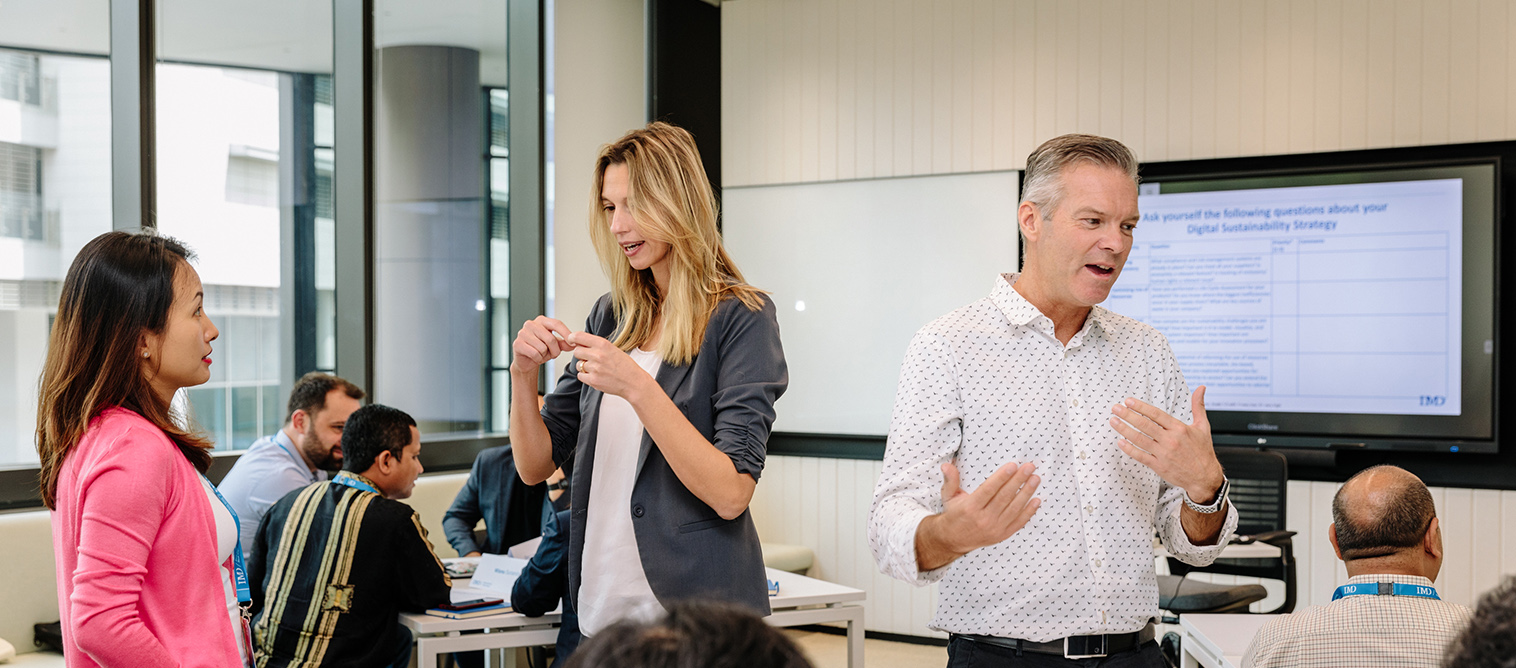On the fifth and final day of IMD’s Orchestrating Winning Performance program in Singapore, faculty and participants looked at stress and strategic transformations before sharing their reflections on the week.
In his session Resilient leader: Powering through in the face of adversity, Jean-François Manzoni, IMD’s President and Nestlé Chaired Professor, talked about resilience as an essential skill for chief executives to develop.
He explained how, originally, resilience “is not a management concept, it’s very much a psychological concept”, having emerged from studies of individuals who had “suffered severe traumas but managed to overcome them and go on to thrive in their personal and professional lives”.
The concept of resilience has a significant place in business, as our colleague George Kohlrieser has been explaining for years. “There is often a lot of grief in organizations,” he says. A crucial point he makes is that executives often underestimate the presence of this sense of loss and mistake it for complacency.
“What you’re confusing for complacency is people simply being in a state of shock,” he explained, citing loss of control, loss of security, and the loss of the dream that people had in their own minds. Resilience, he said, is the ability to bounce back after a setback, and is an essential skill to develop.
“It keeps you functioning at a high level,” he said. “It has a number of positive implications in terms of engagement and job satisfaction.” But, he argued, there were broader benefits too, as it helps build emotional intelligence and will help staff to remain calm and in control.
“As leaders, we are on stage all of the time and our behavior is contagious. Resilience helps us digest the stress.”
Perhaps most crucially, he concluded, learning how to be more resilient is good for individual health. “Stress is fundamentally not bad for you, but chronic stress is extremely bad for you because it triggers inflammation which itself is the cause of many illnesses.”
The need to communicate
In her session Leading people through strategic transformations, Katharina Lange, Affiliate Professor of Leadership, led a panel discussion about how teams should be coached.
Panelist John Davison, former chief executive of Asian healthcare services provider Zuellig Pharma and Rotterdam-based tea producer Ekaterra, recalled the start of his tenure as chief executive of Ekaterra in 2021. He said, “It takes a huge amount of energy,” he said. “I must have done 100 town halls online in the first year.”
For him, coaching is about helping his team bridge that gap and create “ownership and accountability”, and emphasized the need for open discussion. “Above all, you need to communicate,” he said.
“You need to go the extra mile yourself, but you also have to make sure that you set the example for how your team communicates.”
Cloris Zhang, SVP of Supply Chain, Asia, Middle East, and Africa for multinational food company Mondelez, picked up the theme, and voiced her belief that it comes from within. “I changed the way that I ask questions,” she said. “The only thing you can change is your own behavior as a leader.”
Summing up, Lange added: “Creating trust is one of the first things we need to do to retain the team through transformations. And I love the vision that all of the panelists had – to become the best company to work for.”
Different flavors
In the final session of the week, Misiek Piskorski, Dean of IMD Southeast Asia and Oceania, invited some of the faculty to share the insights that they had gathered from participants.
Howard Yu, IMD Professor of Management and Innovation, noted that the faculty not only got energy from participants but also inspiration for research. “We saw during the pandemic that future-ready organizations are simply are able to pivot much faster,” he said.
Michael Wade, Professor of Innovation and Strategy, took to the theme of cooking.
“This week has been all about putting different flavors together,” he said. “Certainly flavors of content. But also the diversity of ingredients. Learning is to challenge yourself to try different flavors, different ingredients, so you might find something that’s new and useful.”
Julia Binder, Professor of Sustainable Innovation and Business Transformation, stayed with the metaphor of food, and admitted that sustainability is sometimes “hard to digest”, but said the week had given her the energy to continue pushing.
“We look at sustainability as something that is dangerous and negative,” she said. “But we also need to see this as an opportunity.”
Lange summarized by saying, “The first lesson is to take the job seriously, not yourself. The second is to get people from the ecosystems that drive tomorrow’s business. The third is to lead with international intentionality and flexibility and be prepared to manage the trade-offs that come from that flexibility.”
Finally, Manzoni pointed out how “energizing” OWP had been not just for participants, but for the faculty too. He called it a “shot in the arm”. He said, “A few years ago, saying that an organization is going to contribute to society was a good thing to do. It was called Corporate Social Responsibility. Increasingly, what you will notice is that it will become impossible for organizations to do well financially if they’re not also making a positive difference in the world. You are hopefully the leaders that will contribute to make a difference.”



